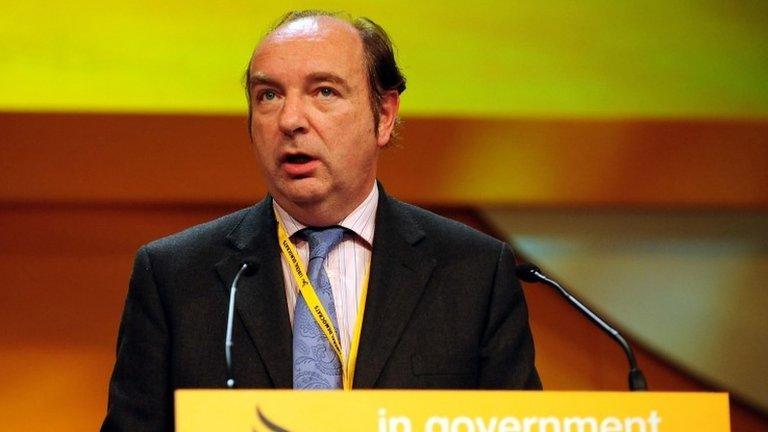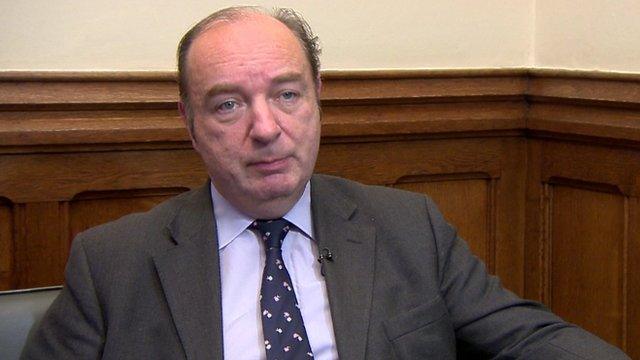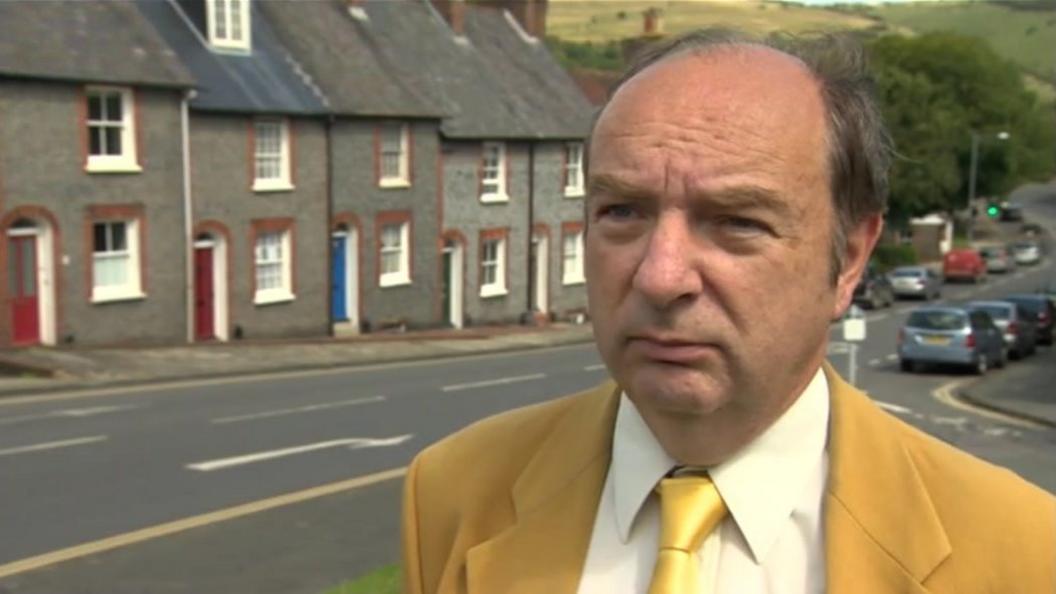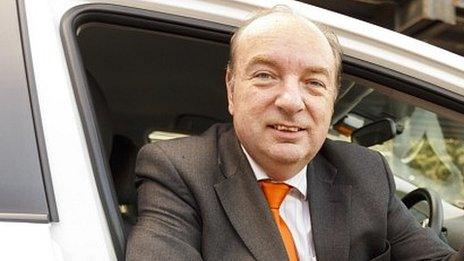Norman Baker quits as Home Office minister
- Published
- comments
Norman Baker: "It was a constant battle to try to get things through"
Liberal Democrat MP Norman Baker has resigned as a Home Office minister, saying working in the department was like "walking through mud".
Working with Home Secretary Theresa May was a "constant battle", he said, as she thought she was in a "Conservative government with a few Lib Dems in it".
Lib Dem leader Nick Clegg said he understood Mr Baker's reasons and said he had been an "outstanding" minister.
But one former Tory colleague suggested Mr Baker was not a team player.
Mr Baker's resignation, which he announced in the Independent, external, has put fresh strain on coalition relations six months ahead of the general election.
The MP for Lewes faces a challenge holding on to his Sussex seat in May, which he won with a majority of just over 7,000 in 2010.
'Need a break'
The BBC's assistant political editor Norman Smith said the Lib Dems were portraying Mr Baker's exit as a personal decision and playing down any sense of the coalition "splintering".
Mr Baker told the BBC it had been gruelling being the only Lib Dem minister in the Home Office since October 2013 and he "wanted a break" to spend time in his constituency and with his family.
While describing Mrs May as a "formidable, intelligent and competent" politician, he said the way she ran her department in an era of coalition government was "disappointing".
Nick Clegg: "I understand and respect the reasons that he's given for standing down as a minister"
"It was like walking through mud," he said. "The home secretary was, I think, reluctant to let me have my head and it was a constant battle to try to get things through, and I think that's unfortunate not just for the Home Office but actually for the government."
Mrs May, he added, "believed she was running a Conservative department in a Conservative government with the Lib Dem members almost there by default".


Analysis by BBC deputy political editor James Landale
Norman Baker left office with a few passing shots at Theresa May's lack of collegiality, saying he was treated like a "cuckoo in the nest" at the Home Office where it was "like walking through mud".
He said he was resigning to take a break from all this so he could spend some more time with his family and his music.
Not surprisingly, some Conservatives have not been slow in painting a different picture. They suggest that he resigned to defend his fragile 7,000 majority in Lewes, a battle which they allege had been claiming more of his time than the Home Office.

While he suggested the Conservatives had "lurched to the right" on issues such as immigration, he said the government was still "functioning" and would last until the election.
Mr Baker and Mrs May have clashed over drugs policy, with the Lib Dem MP recently calling for sweeping changes to the UK's approach following the publication of a Home Office report, external which he accused the Conservatives of blocking.
He said the government should ditch what he called the "inappropriate rhetoric of the 1950s" and focus more on treatment but the Home Office said policy would not change.
In his resignation letter to his party leader, external, Mr Baker said he was pleased with his achievements in the Home Office but unlike in the Department for Transport, where he had previously been a minister, "the goodwill to work collegiately to take forward rational evidence-based policy has been in somewhat short supply".
The keen musician, whose band The Reform Club released its first single last year, said being a minister and a constituency MP had "squeezed" the time he had available for his family and his music.

By Ross Hawkins, political correspondent, BBC News
The only hippy at an Iron Maiden concert. That newspaper description of Norman Baker as a Lib Dem minister in the Home Office was among his kinder write-ups.
He was dubbed a conspiracy theorist on his appointment; he wrote a book suggesting the weapons scientist Dr David Kelly was murdered.
He is leaving in part, he says, to spend more time with his music. One of his band's videos shows him serenading slightly bemused tourists in Piccadilly Circus, external.
His resignation gives him both a chance to remind voters how badly he fell out with the Tories, and time to go knocking on their doors before a tough election.
It's tricky for his party, who have to find a stop-gap minister to replace him until the election. It could be trickier still if other Lib Dem ministers were tempted to follow his logic.

Mr Clegg wrote back: "However complex the issues have been, or challenging the coalition relations have proved to be, you have handled the political relationships within government with great skill, always focusing on how to achieve liberal reform wherever you can."
'Personality clash'
Lib Dem President Tim Farron said the focus should be on Mrs May rather than Mr Baker, claiming she ran the Home Office as "if the Conservatives won the last election", adding that this was an "insult to the electorate".
He insisted that the coalition could still function until the general election in May and Mr Baker's departure was the "exception to the rule" of decent working relations between the two parties.
Former Conservative Home Office minister Damian Green said he believed Mr Baker left due to a "clash of personalities" rather than any disagreement over policy.
"What you can't do is just go off on your own - which is what Norman quite often wanted to do - and say, 'Look, I believe this, so this is what the Home Office is going to do.'
Referring to Mr Baker's love of music, he likened him to a "guitarist who was only interested in his own solos while the rest of the band was trying to play a close harmony number".
'Record of failure'
As a backbench MP, Mr Baker claimed government scientist David Kelly was murdered in 2003 and said this may have been hushed up by the UK authorities.
But when he was appointed as a crime prevention minister in the Home Office, he described his views on Dr Kelly as "history" and his relations with Mrs May as "friendly".
Speaking in the House of Commons on Tuesday, Chancellor George Osborne said there was a "vacancy for a conspiracy theorist" in the Home Office following Mr Baker's departure.
Labour's shadow home office minister Diana Johnson accused Home Secretary Theresa May of "losing control of her department".
She added: "As for the Lib Dems, this resignation has nothing to do with principle. They will be judged on their actions in government where their record is one of failure having backed the Tories all the way."
Mr Baker was the third Lib Dem minister to serve in the Home Office since 2010.
Lynne Featherstone moved to the Department for International Development in 2012 after helping to shape government policy on female genital mutilation.
Jeremy Browne, who succeeded her, was in turn replaced a year later amid suggestions that he had not been consulted by his Conservative colleagues about a controversial immigration initiative.
- Published4 November 2014
- Published4 November 2014

- Published4 November 2014

- Published30 October 2014

- Published30 October 2014

- Published18 March 2013

- Published14 August 2014

- Published8 October 2013
